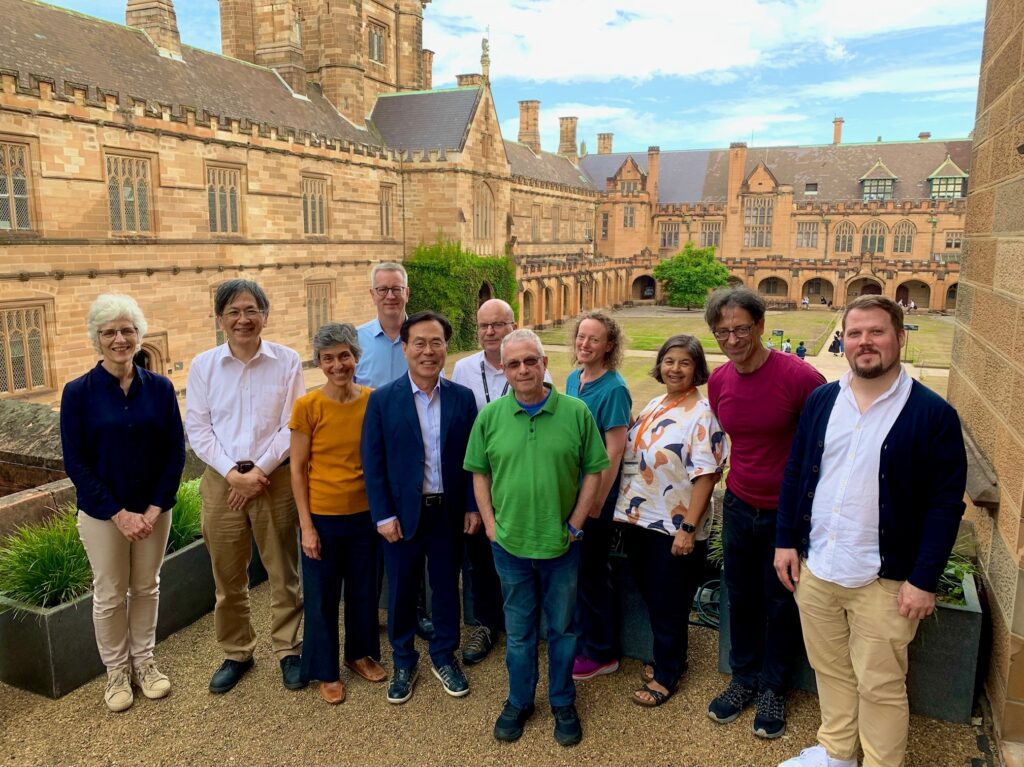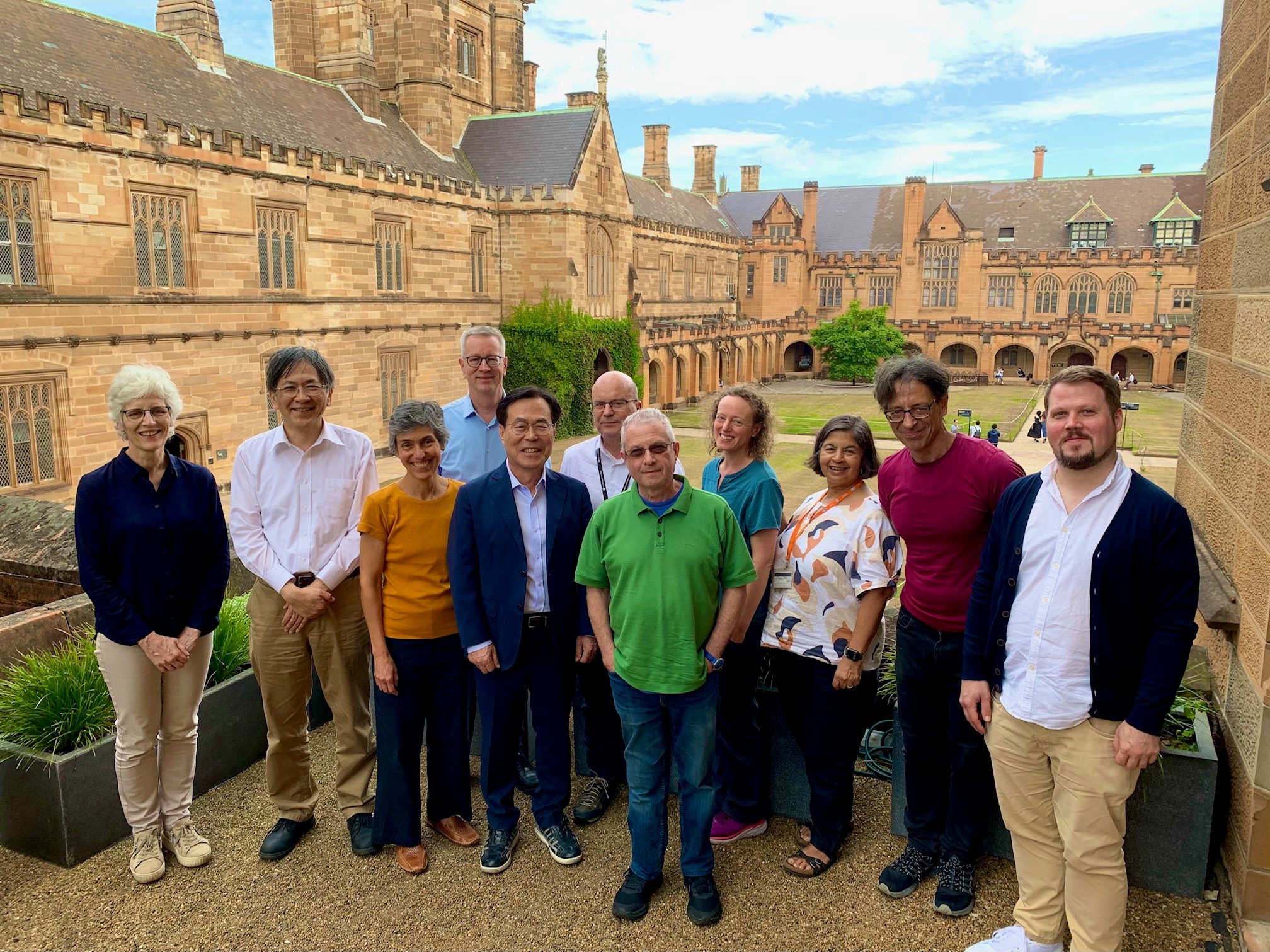
In March, SMRI welcomed the Executive Committee of the International Mathematical Union (IMU). As well as hosting their two-day annual IMU Executive Committee Meeting, SMRI hosted a series of events following the meeting, over two days, 25-26 March. Participants had an opportunity to interact with members of the Executive Committee, as well as international visitors to SMRI and Australian mathematical colleagues, through four colloquium-style mathematics talks, three panel discussions and an evening reception in the Great Hall, situated in the University’s iconic Quadrangle.
Four excellent talks were given by Hiraku Nakajima (University of Tokyo), Paolo Piccione (University of São Paulo), Geordie Williamson (SMRI) and Tamar Ziegler (Hebrew University), and the three panels were as follows:
- IMU panel on Early Career Researchers (moderator: Jordan Pitt, University of Sydney)
- Perspectives on Mathematics: Its Humanity, Culture, and Communication (moderator: Francis Su, Harvey Mudd College)
- WIMSIG panel: Women shaping the future of mathematics (moderator: Zsuzsanna Dancso, University of Sydney)
Talks
‘Transformers for the working mathematician’
Geordie Williamson, Sydney Mathematical Research Institute
Abstract: A transformer is a type of neural network, which is particularly well-suited to sequential inputs like language. It is the architecture behind large language models like chatGPT. Many mathematical objects can be encoded as sequences of tokens, and thus this architecture appears well-suited to several problems in mathematics, particularly for the generation of interesting examples. I will give a survey of some applications of transformers on math problems. The emphasis will be on toy examples from graph theory and extremal combinatorics, where I believe one sees most clearly the potential of these ideas.
‘Sign patterns of the Mobius function’
Tamar Ziegler (Hebrew University)
Abstract: The Mobius function is one of the most important arithmetic functions. There is a vague yet well known principle regarding its randomness properties called the “Mobius randomness law”. It basically states that the Mobius function should be orthogonal to any “structured” sequence. P. Sarnak suggested a far reaching conjecture as a possible formalization of this principle. He conjectured that “structured sequences” should correspond to sequences arising from deterministic dynamical systems. Sarnak’s conjecture follows from Chowla’s conjecture – which is the Mobius version of the prime tuple conjecture. I will describe progress in recent years towards these conjectures.I will describe progress in recent years towards these conjectures, building on major advances in dynamics, additive combinatorics, and analytic number theory.
‘Algebraic and topological methods for the Yamabe problem’
Paolo Piccione (University of São Paulo)
Abstract: The Yamabe problem addresses the existence of Riemannian metrics having constant scalar curvature within a specified conformal class. I will discuss the basics of the problem, and present some results on the multiplicity of complete solutions on noncompact manifolds, obtained using algebraic and topological techniques.
‘Geometry of quiver representations’
Hiraku Nakajima (University of Tokyo)
Abstract: A quiver representation consists of a collection of vector spaces and linear maps between them. Its classification is regarded as a generalization of normalization problems of linear matrices such as elementary row/column operations, Jordan normal forms, etc. In general, it is difficult and intractable. Then people consider moduli spaces — spaces of all representations up to isomorphism and explore their geometric properties, starting from their dimension, smoothness, even their topology. It turns out that moduli spaces are interesting geometric objects, as I found 30 years ago.
Panel descriptions
Panel 1: IMU panel on Early Career Researchers
Moderator: Jordan Pitt (University of Sydney)
This will be a discussion between early career researchers and an IMU Executive member about the challenges faced by early career researchers. It will be a chance to provide advice and perspective to early career researchers and voice the complexities and challenges about this career stage.
Panel 2: Perspectives on Mathematics: Its Humanity, Culture, and Communication
Moderator: Francis Su (Harvey Mudd College)
This panel will explore and illuminate the human side of mathematics—the culture(s) of mathematics, how we teach and do research in it, who we include, and the impact of how we communicate maths to students and the broader public. Discussions with the panellists will help participants envision how they can improve the culture, practices, and communication around maths to better serve their communities.
Panel 3: WIMSIG panel: Women shaping the future of mathematics
Moderator: Zsuzsanna Dancso (University of Sydney)
In this future-focussed discussion, two members of the IMU Executive committee will be joined by prominent Australian mathematicians to discuss the role, challenges and triumphs of women in contemporary mathematics worldwide. What has changed in recent decades, and what are we still working to change? What can we – mathematicians of all genders – do to foster an inclusive and successful community?

